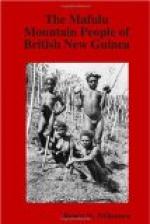The man’s garden plot or plots are also his own, having been cleared by him or some predecessor of his out of his or that predecessor’s own bush land; and he may build in his gardens as many houses as he pleases. His ownership of his garden plot is more exclusive than is that of his bush land, as other people are not entitled to pass over it. But on the other hand, if he abandons the garden, and nature again overruns it with growth—a process which takes place with great rapidity—it ceases to be his garden, and reverts to, and becomes absorbed in, the portion of the bush out of which it had been cleared; and if, as it may be, he is not the sole owner of that portion of bush, he loses his exclusive right to the land, which as a garden had been his own sole property.
No man can sell or exchange either his bush land or his garden plots, and changes in their ownership therefore only arise through death and inheritance. This statement, however, is, I think, subject to the qualification that an owner of bush-land will sometimes allow his son or other male descendant to clear and make for himself a garden in it; but I am not sure as to the point.
On a man’s death his widow, if any, does not inherit any portion of his property, either movable or immovable, but three things are allowed to her. She is generally allowed one pig, which will be required by her at a later date for the ceremony of the removal of her mourning; and she shares with her husband’s children, or, if there be none, she has the sole right to, the then current season’s crops and fruit resulting from the planting effected by her late husband and herself, though this is a right which, after her return home to her own people, she would not continue to exercise; and she is allowed to continue to occupy her husband’s house, but this latter privilege terminates at the mourning removal ceremony, when the house will be pulled down, and its site will revert to the village, and she will probably return to her own people in her own village, if she has not done so previously.
Subject to these three allowances, I may dismiss the widow entirely in dealing with the law of inheritance. I may also dismiss the man’s female children by saying that, if there be male children, the females do not share at all in the inheritance, and even if there be no male children the female children will only perhaps be allowed, apparently rather as a matter of grace than of right, to share in his movable effects; and that, subject to this, everything goes to the man’s male relatives. I may also eliminate the man’s pigs, as apparently any pigs he has, other than that retained for his widow, are killed at his funeral.




